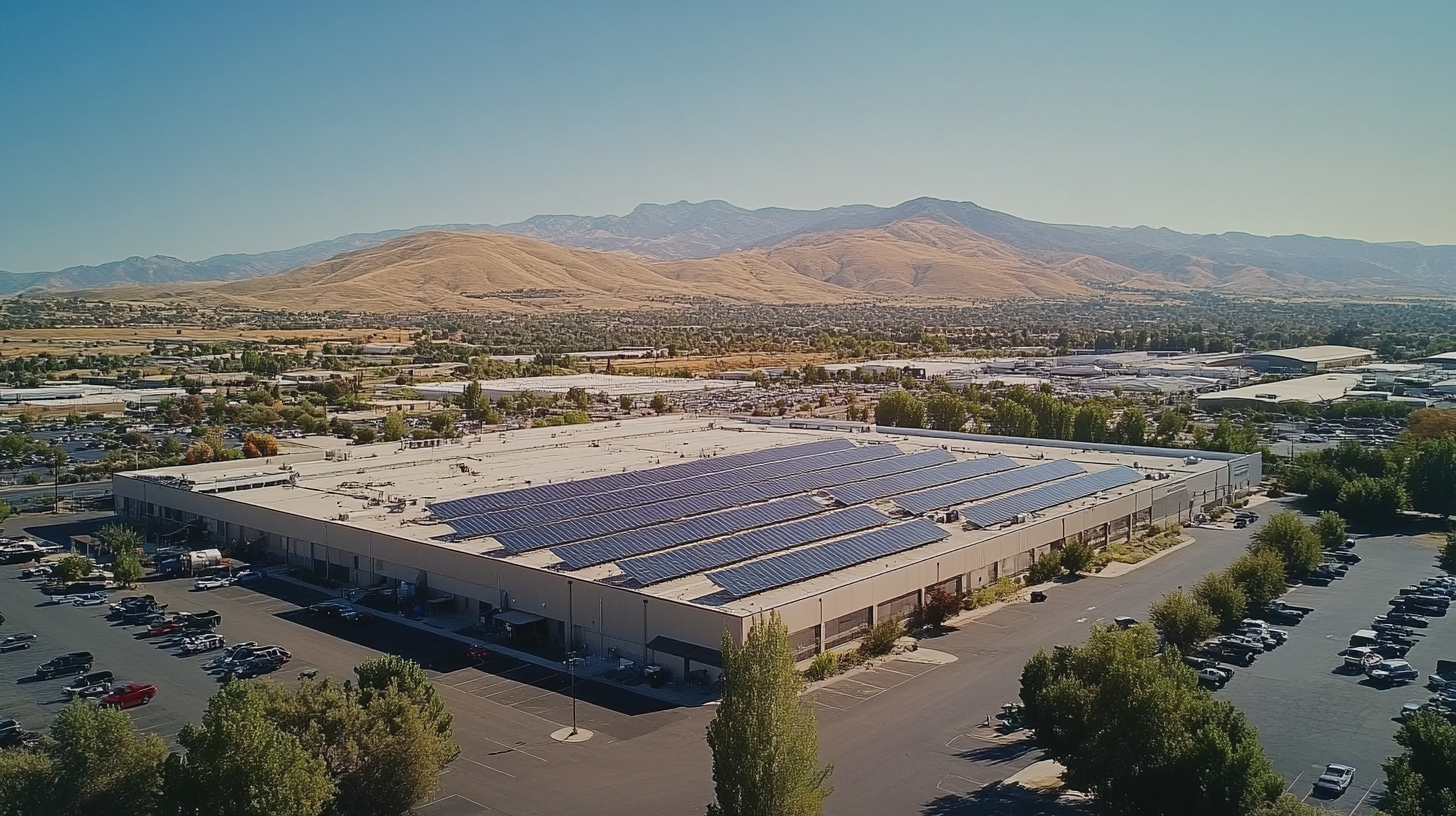Blog
- Home
- Blog
Maximizing Supply Chain Efficiency with Renewable Solar Energy Solutions for Global Buyers
In an era where sustainability is increasingly intertwined with business success, the integration of Renewable Solar solutions into supply chain strategies has emerged as a pivotal focus for global buyers. Recent studies indicate that solar energy adoption can reduce supply chain energy costs by up to 75%, drastically enhancing operational efficiencies. According to the International Renewable Energy Agency (IRENA), the solar industry has seen an impressive annual growth rate of 20% over the last decade, positioning it as one of the fastest-growing sectors in the energy landscape. Furthermore, a report by McKinsey & Company states that companies integrating renewable energy sources into their operations can improve their resilience against volatility in energy prices and supply disruptions. By harnessing the power of Renewable Solar, businesses not only contribute to global sustainability goals but also achieve significant cost savings and operational advantages, reinforcing their competitive edge in today’s dynamic market.

Understanding the Role of Solar Energy in Supply Chain Optimization
The integration of renewable solar energy solutions into supply chain operations is a game-changer for global buyers looking to optimize efficiency. According to a report from the International Energy Agency (IEA), the global demand for renewable energy is projected to increase by 24% in the next five years, underscoring the growing interest in sustainable practices. By harnessing solar energy, companies can reduce their reliance on fossil fuels, minimize carbon footprints, and achieve considerable cost savings in their operational expenditures.
Moreover, a study by McKinsey & Company highlights that companies that invest in renewable energy within their supply chains can achieve a 10-15% reduction in energy costs. These savings are further enhanced through the use of solar power systems, which can provide a stable and predictable energy source, leading to improved inventory management and production scheduling. As businesses increasingly prioritize sustainability, those that leverage solar solutions not only contribute to environmental goals but also position themselves competitively in the marketplace by appealing to eco-conscious consumers.
Maximizing Supply Chain Efficiency with Renewable Solar Energy Solutions
This chart illustrates the impact of solar energy adoption on supply chain efficiency across different regions. The efficiency is measured by the percentage reduction in operational costs as companies leverage solar energy solutions in their logistics and production processes.
Key Benefits of Integrating Renewable Energy in Global Logistics
The integration of renewable energy sources like solar power into global logistics presents numerous advantages, particularly as businesses look to enhance supply chain efficiency. According to recent studies, logistics integration that leverages renewable energy can significantly improve supply chain performance by moderating operational costs and reducing carbon footprints. With the logistics sector being a major contributor to greenhouse gas emissions, the transition to green energy solutions is not just beneficial but essential. It has been reported that companies utilizing renewable energy in their supply chains can reduce energy costs by up to 30%, providing a robust incentive to make the shift.
Moreover, as reported in the 2024 International Journal of Supply Chain and Logistics, there is a clear correlation between efficient energy utilization and the agility of supply chains. Businesses adopting green logistics strategies can gain a competitive edge by enhancing their resilience against market disruptions. For instance, companies that invest in renewable energy solutions are better equipped to adjust to fluctuations in energy prices and supply chain constraints, ultimately driving sustainable development. This is particularly vital as industries strive to meet aggressive decarbonization targets, where energy derived from solar and wind sources plays a pivotal role in ensuring a stable and environmentally responsible logistics framework.
Maximizing Supply Chain Efficiency with Renewable Solar Energy Solutions for Global Buyers
| Aspect | Description | Benefits | Impact on Efficiency |
|---|---|---|---|
| Cost Reduction | Using solar energy reduces operational costs. | Lower utility bills and improved ROI. | Increased margins through reduced energy costs. |
| Sustainability | Integrating renewable energy contributes to greener practices. | Enhanced brand reputation and customer loyalty. | Improved efficiency through alignment with global sustainability goals. |
| Energy Independence | Solar solutions provide a stable energy source. | Reduction in reliance on fossil fuels and energy price volatility. | Enhanced predictability in logistics operations. |
| Technological Innovation | Incorporating cutting-edge solar technologies. | Access to advanced solutions in logistics. | Increased operational efficiency and competitiveness. |
| Scalability | Solar systems can be scaled according to business needs. | Flexible energy solutions that grow with the business. | Enhanced ability to adapt to changing market conditions. |
Strategies for Implementing Solar Solutions in Supply Chains
As the global demand for sustainable solutions increases, integrating renewable solar energy into supply chains presents an invaluable opportunity for companies to enhance efficiency and reduce costs. Implementing solar energy solutions requires a strategic approach to ensure maximum benefits. One effective strategy is to assess and understand the specific energy consumption patterns across the supply chain. This enables companies to identify optimal locations for solar installations, ensuring that energy generation aligns with peak usage times.
Tip: Conduct a comprehensive energy audit to pinpoint areas with the highest energy consumption and potential for solar panel installations. This step will provide insights into where solar solutions can deliver the greatest impact.
Additionally, collaboration with stakeholders throughout the supply chain can drive successful implementation of solar technologies. Engaging suppliers and logistics partners creates opportunities for shared investments and alignment of sustainability goals. Establishing partnerships can also enhance access to financing options and innovative technologies, making it easier to transition to solar energy.
Tip: Form alliances with other industry players and sustainability-focused organizations to share best practices and resources for implementing solar energy solutions effectively.
Maximizing Supply Chain Efficiency with Renewable Solar Energy Solutions
This pie chart illustrates the potential benefits of implementing solar energy solutions in supply chains for global buyers. The segments represent different areas of efficiency improvement:
- Cost Reduction: 40%
- Carbon Footprint Reduction: 30%
- Energy Independence: 20%
- Brand Image Improvement: 10%
Case Studies: Successful Solar Energy Adoption by Leading Companies
The adoption of renewable solar energy solutions by leading companies is revolutionizing the supply chain landscape. A notable example can be seen in the deployment of solar-powered bus stops in Tianjin, which stands as a testament to China’s commitment to innovation in this sector. These cutting-edge bus shelters integrate 28 thin-film solar panels, enabling them to harness solar energy for various functionalities. From providing access to news and e-book lending services to offering city-wide Wi-Fi hotspots, these solar installations illustrate how companies can leverage sustainable technology to enhance urban infrastructure and improve customer experience.
In addition to boosting operational efficiency, the case studies of successful solar energy implementation reflect broader trends in corporate sustainability efforts. For global buyers, supporting suppliers that invest in renewable energy not only aligns with environmental goals but also positions them competitively in the market. As leading companies demonstrate the tangible benefits of solar energy, from reduced energy costs to enhanced brand reputation, it becomes clear that integrating renewable solutions into the supply chain is not just a trend, but a strategic necessity for thriving in the modern economy.

Future Trends: The Evolving Landscape of Solar-Powered Supply Chains
The growing emphasis on sustainability has led to a transformative shift in the way supply chains are structured, particularly with the integration of solar energy solutions. According to a report from the International Energy Agency (IEA), solar energy has become the fastest-growing source of renewable energy, with global capacity expected to rise by over 200% by 2025. This trend is crucial for supply chain managers aiming to enhance efficiency while lowering carbon footprints. Firms leveraging solar-powered technologies not only align with environmental regulations but also capitalize on forecasted cost savings. The LCOE (Levelized Cost of Energy) for solar has dropped by over 80% since 2010, making it a financially viable option for global buyers seeking reliability in their supply chains.
Furthermore, the increasing accessibility of solar storage solutions supports a more resilient supply chain ecosystem. As highlighted in the 2023 Solar Market Insight Report, the global market for energy storage is projected to reach $5.6 billion by 2027, fostering a more stable energy supply that can adapt to fluctuations in demand. This evolution allows businesses to harness solar energy effectively during peak production times and store excess energy for later use, thus optimizing resource allocation and minimizing disruption risks. Overall, the synergy between solar energy and supply chain management positions companies to thrive in a competitive marketplace while paving the way for more sustainable practices.
